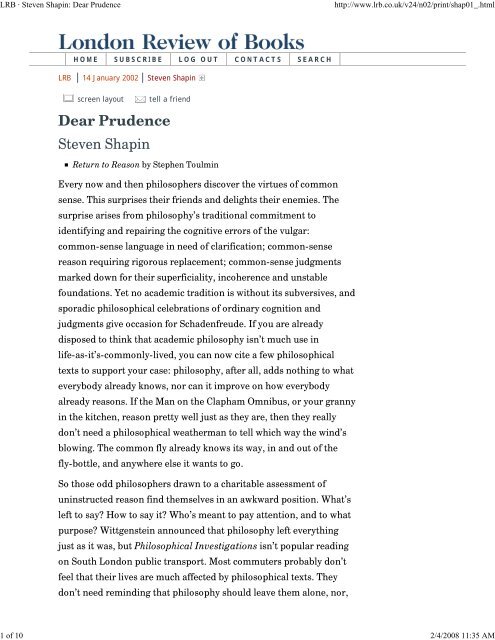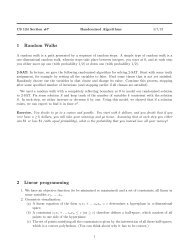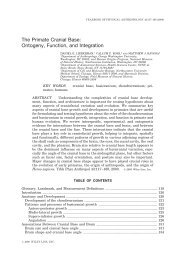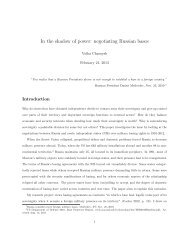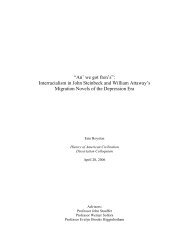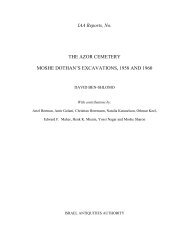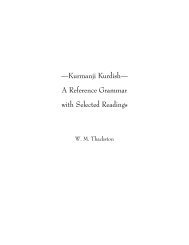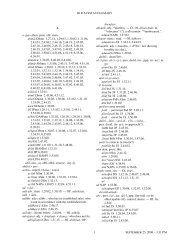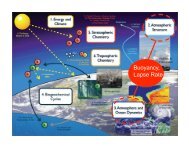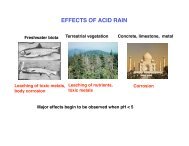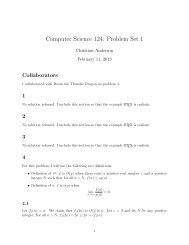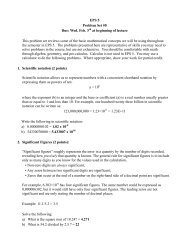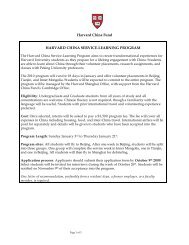LRB · Steven Shapin: Dear Prudence
LRB · Steven Shapin: Dear Prudence
LRB · Steven Shapin: Dear Prudence
You also want an ePaper? Increase the reach of your titles
YUMPU automatically turns print PDFs into web optimized ePapers that Google loves.
<strong>LRB</strong> <strong>·</strong> <strong>Steven</strong> <strong>Shapin</strong>: <strong>Dear</strong> <strong>Prudence</strong><br />
http://www.lrb.co.uk/v24/n02/print/shap01_.html<br />
1 of 10 2/4/2008 11:35 AM<br />
HOME SUBSCRIBE LOG OUT CONTACTS SEARCH<br />
<strong>LRB</strong> 14 January 2002<br />
<strong>Steven</strong> <strong>Shapin</strong><br />
screen layout tell a friend<br />
<strong>Dear</strong> <strong>Prudence</strong><br />
<strong>Steven</strong> <strong>Shapin</strong><br />
Return to Reason by Stephen Toulmin<br />
Every now and then philosophers discover the virtues of common<br />
sense. This surprises their friends and delights their enemies. The<br />
surprise arises from philosophy’s traditional commitment to<br />
identifying and repairing the cognitive errors of the vulgar:<br />
common-sense language in need of clarification; common-sense<br />
reason requiring rigorous replacement; common-sense judgments<br />
marked down for their superficiality, incoherence and unstable<br />
foundations. Yet no academic tradition is without its subversives, and<br />
sporadic philosophical celebrations of ordinary cognition and<br />
judgments give occasion for Schadenfreude. If you are already<br />
disposed to think that academic philosophy isn’t much use in<br />
life-as-it’s-commonly-lived, you can now cite a few philosophical<br />
texts to support your case: philosophy, after all, adds nothing to what<br />
everybody already knows, nor can it improve on how everybody<br />
already reasons. If the Man on the Clapham Omnibus, or your granny<br />
in the kitchen, reason pretty well just as they are, then they really<br />
don’t need a philosophical weatherman to tell which way the wind’s<br />
blowing. The common fly already knows its way, in and out of the<br />
fly-bottle, and anywhere else it wants to go.<br />
So those odd philosophers drawn to a charitable assessment of<br />
uninstructed reason find themselves in an awkward position. What’s<br />
left to say? How to say it? Who’s meant to pay attention, and to what<br />
purpose? Wittgenstein announced that philosophy left everything<br />
just as it was, but Philosophical Investigations isn’t popular reading<br />
on South London public transport. Most commuters probably don’t<br />
feel that their lives are much affected by philosophical texts. They<br />
don’t need reminding that philosophy should leave them alone, nor,
<strong>LRB</strong> <strong>·</strong> <strong>Steven</strong> <strong>Shapin</strong>: <strong>Dear</strong> <strong>Prudence</strong><br />
http://www.lrb.co.uk/v24/n02/print/shap01_.html<br />
2 of 10 2/4/2008 11:35 AM<br />
again, are they likely to feel greatly flattered by a deviant<br />
philosopher’s judgment that, on the whole, they’re quite competent<br />
reasoners.<br />
If you’re a philosophical defender of ordinary reasoning, the only<br />
people whose conceptions actually need to be clarified and repaired,<br />
and who actually care about what you say, are other academic<br />
philosophers who have bewitched themselves into a sense of a<br />
civilising mission. For Richard Rorty, philosophers’ obsession with<br />
such merely mood-enhancing words as Reason, Reality, Truth,<br />
Objectivity and Method is little more than the fetishism of an<br />
increasingly parochial discipline. If you really want to understand<br />
how knowledge is made and judgments are justified, then get out of<br />
your endowed armchair and take a close look at how people in their<br />
various activities actually do such things, quite efficiently and to their<br />
general satisfaction. You’ll probably find that commuters, cooks and<br />
chemists aren’t greatly concerned with conceptions of Reason, Reality<br />
and Truth. Valued social and cultural practices don’t depend on<br />
metaphysical presuppositions or rational justifications: ‘There are<br />
lots of things you can’t justify that are important. Your mother, for<br />
example.’ By Rorty’s implication, at least, philosophers should either<br />
shut up shop or take themselves off to the humbler departments of<br />
sociology, history and psychology: ‘Philosophy does not make much<br />
difference to our practices, and should not be allowed to do so . . . For<br />
most purposes, whether we have any philosophers around or not<br />
doesn’t greatly matter.’ Just as philosophers should not be bewitched<br />
by talk of foundations and metaphysical presuppositions, so ordinary<br />
folk have no reason to be bewitched by philosophers, whether the<br />
philosophers themselves are bewitched or not. Rorty does have a<br />
message for the laity – ‘relax’ – but he doesn’t leave a philosophical<br />
idiom in saying so. Like philosophy, anti-philosophy is for the<br />
philosophers.<br />
Stephen Toulmin’s work over the past half-century shares<br />
sensibilities and rhetorical styles with the later Wittgenstein and<br />
(more recently) with Rorty: there’s something wrong with modern<br />
academic philosophy (especially the philosophy of morals and of<br />
science) that flows, in Toulmin’s view, from its disciplinary
<strong>LRB</strong> <strong>·</strong> <strong>Steven</strong> <strong>Shapin</strong>: <strong>Dear</strong> <strong>Prudence</strong><br />
http://www.lrb.co.uk/v24/n02/print/shap01_.html<br />
3 of 10 2/4/2008 11:35 AM<br />
narrowness, its arrogance and its self-referential<br />
hyper-professionalism. It’s a position Toulmin came to quite<br />
naturally. Having trained in physics, and worked on radar in the RAF<br />
during the Second World War, he went up to Cambridge in 1946 to<br />
read philosophy. Richard Braithwaite was his Doktorvater, but<br />
Wittgenstein, then in his last years of teaching, was his greatest<br />
influence. Reason in Ethics (1950), Toulmin’s doctoral thesis, was the<br />
beginning of a lifelong campaign to show the power of case-based<br />
moral reasoning. Philosophers’ axiomatic approach to ethics ‘had<br />
nothing to offer Everyman but confusion’, and no current<br />
philosophical theories offered ‘any adequate account of the nature of<br />
ethical reasoning’ as a naturally occurring phenomenon. In 1953, his<br />
short introduction to The Philosophy of Science expressed scepticism<br />
about philosophical efforts to render science as a formal, axiomatic<br />
system of propositions. And in 1958, The Uses of Argument blurred<br />
the much insisted-on distinction between rhetoric and logical<br />
argument. Reasoning, Toulmin argued, was an argumentative and<br />
persuasive activity, embedded in concrete human predicaments. In a<br />
judgment that evidently still wounds, colleagues dismissed this as<br />
‘Toulmin’s anti-logic book’. The philosophers hated it, but for the<br />
rhetoricians, particularly in America, The Uses of Argument became,<br />
and remains, a canonical text.<br />
Happily growing up in a family ‘where history was a matter for dinner<br />
table conversation’, the young Toulmin was distressed by the<br />
ahistorical character of academic philosophical writing, and by the<br />
late 1950s and early 1960s he was turning his hand to the history of<br />
science and philosophy. With his then-wife June Goodfield, he<br />
produced three synthetic books, The Fabric of the Heavens (1961),<br />
The Architecture of Matter (1962) and The Discovery of Time (1965),<br />
all of which won a wide readership and all of which remain in print.<br />
From that point on, Toulmin’s output became a patchwork whose<br />
pieces mainly comprised metascientific and epistemological<br />
commentary, historical studies of scientific concepts, and<br />
contributions to ethics and cultural criticism. The only<br />
disappointment was his single go at Big Book systematicity – the<br />
1972 Human Understanding: Volume I (the promised volumes II<br />
and III never happened) – an attempt at an evolutionary scheme for
<strong>LRB</strong> <strong>·</strong> <strong>Steven</strong> <strong>Shapin</strong>: <strong>Dear</strong> <strong>Prudence</strong><br />
http://www.lrb.co.uk/v24/n02/print/shap01_.html<br />
4 of 10 2/4/2008 11:35 AM<br />
interpreting disciplinary rationalities. In the tradition of Montaigne,<br />
Bacon, Hume and Berlin, a great deal of Toulmin’s best, most<br />
resonant and most humane writing is in the looser and more<br />
fragmentary essay form. But his most consequential work since the<br />
1970s has included The Abuse of Casuistry (1988, with Albert<br />
Jonsen) and, especially, Cosmopolis: The Hidden Agenda of<br />
Modernity (1990), an effort at historicising the early modern quest<br />
for methodical certainty in science and philosophy.<br />
Much of what Toulmin has been up to recently reads as if it were a<br />
gloss on an exchange between Salviati and the naive Aristotelian,<br />
Simplicio, in Galileo’s Dialogue. Salviati – His Master’s Voice –<br />
expounds the value of mathematics in the treatment of physical<br />
problems. Salviati knows that Simplicio is going to object on the<br />
grounds of illegitimate idealisation: ‘These mathematical subtleties<br />
do very well in the abstract, but they do not work out when applied to<br />
sensible and physical matters.’ Salviati isn’t fazed: he can paint a<br />
picture of an abstract physical world in which his mathematical<br />
principles apply universally, and that is the source of their power and<br />
authority. To this construction Simplicio has no answer, since Galileo<br />
doesn’t give him one. But Simplicio could have pressed his case.<br />
Suppose Simplicio refuses to be either satisfied or impressed by the<br />
coherence, the timelessness and the universal scope of the Galilean<br />
ideal realm. Suppose he demands an account of the physical<br />
behaviour of medium-sized objects as they actually exist in his visible<br />
world, and as they interact with all sorts of other objects. Suppose he<br />
requires of a philosophical system that it effectively guides practice in<br />
such a concrete, contingent and complex world. Salviati can<br />
approximate such a world, but he can’t fit it exactly, partly because he<br />
hasn’t got the tools, partly because he’s not interested in doing so.<br />
Salviati isn’t bothered, since his idealisations do indeed encompass<br />
everything under the Sun, and the Sun itself; Simplicio could be<br />
bothered, because the idealisations don’t give an adequate account of<br />
what he happens to be interested in, nor do they adequately instruct<br />
him how to sail this particular boat, fire this particular cannon, or<br />
roast this particular chicken. In order for any such dispute to<br />
conclude, there has got to be a resolution of a contest between those
<strong>LRB</strong> <strong>·</strong> <strong>Steven</strong> <strong>Shapin</strong>: <strong>Dear</strong> <strong>Prudence</strong><br />
http://www.lrb.co.uk/v24/n02/print/shap01_.html<br />
5 of 10 2/4/2008 11:35 AM<br />
who speak for the neatly ideal and those who speak for the messily<br />
real. One side or the other has to be rendered culturally mute, cowed<br />
into submission or convinced that their world is a ‘dummy’ version of<br />
the other. In the academic practice of moral philosophy and the<br />
philosophy of science, Simplicio’s voice has been hard to hear, but<br />
Toulmin wants to amplify it and insist on its pertinence. That’s what<br />
Return to Reason is about.<br />
Return to Reason repeats the historical sketch in Cosmopolis of how<br />
canons of Rationality came to dominate the criteria of<br />
reasonableness, how talk of the Universal and the Eternal subjugated<br />
the local and the timely, how the Dreams of Certainty and Method<br />
confidently promised permanent practical solutions to doubt,<br />
ambiguity and the plurality of belief. It’s a history painted here with<br />
the broadest of brushes and the crudest of colours, likely to sour the<br />
stomachs of most specialist historians, but in general terms it carries<br />
plausibility, and the work of such historians as Rudolph Meyer,<br />
Richard Popkin, Margaret Jacob and Simon Schaffer tends broadly to<br />
support it: the bloody wars of religion in the 16th and 17th centuries<br />
appeared as a crisis in the authority and unity of knowledge; the<br />
thinking classes reckoned that peace could be secured and<br />
guaranteed only when means were found to cure scepticism and<br />
ensure uniform belief. Descartes offered such methodical solutions to<br />
the crisis in knowledge, and so, in their different ways, did Hobbes,<br />
Spinoza and Leibniz. European high culture was seduced by these<br />
Dreams of Certainty because the apparent alternatives were so<br />
appalling and because the philosophers did such an effective job of<br />
marketing their product as medicine for the ills of culture and society.<br />
The 17th-century Quest for Certainty (in Dewey’s phrase) turned into<br />
a long-lasting tyranny and a ‘perennial disease of modern thought’. If<br />
ordinary life involved judgment under uncertainty, then this was<br />
proof that ordinary life needed repair by Rational Method.<br />
Uncertainty had to be cured and it could be cured by the right<br />
philosophy or, later, by ‘legislative’ social science. From the 19th<br />
century, economists sought to become ‘the Newtons of the human<br />
sciences’, elaborating neoclassical equilibrium analysis in supposed<br />
imitation of the Principia Mathematica’s rationally intelligible and
<strong>LRB</strong> <strong>·</strong> <strong>Steven</strong> <strong>Shapin</strong>: <strong>Dear</strong> <strong>Prudence</strong><br />
http://www.lrb.co.uk/v24/n02/print/shap01_.html<br />
6 of 10 2/4/2008 11:35 AM<br />
completely predictive model of the solar system. But, to Toulmin, this<br />
act of homage proceeded from a delusion. C. Wright Mills once said<br />
that the problem with much sociology was that it had bought the<br />
wrong philosophy of science, and Toulmin says similarly that the<br />
problem with neoclassical economics is that it imitated ‘the Physics<br />
that Never Was’. In the 1880s, Henri Poincaré’s monograph on the<br />
Three-Body Problem showed that complete predictability is<br />
impossible in systems vastly less complex than the economic order.<br />
Toulmin denounces development economists for insensitivity to<br />
cultural variables and to ‘the practical situation in question’, but it is<br />
just as pertinent to note how economics, and indeed other human<br />
sciences, have the capacity – like it or not – to create modern social<br />
realities shaped at least partly after their own image. If your models<br />
don’t fit the world, then try to reshape the world to fit your models: in<br />
the modern scheme of things, you can sometimes succeed, or at least<br />
succeed in making a ‘real’ mess. (Think of the Western economists’<br />
role in the former Soviet Union.) So if you want to say, as Toulmin<br />
does, that strands of these sciences are inappropriate in practical<br />
application, it’s not just because they’re insensitive to concrete social<br />
realities but because you think the new realities they help bring into<br />
being are lacking in justice and morality. Criticising a faulty<br />
epistemology won’t completely let you off the hook of stating your<br />
moral and political preferences, justifying them as best you can, and<br />
then acting on them.<br />
The Quest for Certainty travels along the channels historically carved<br />
out by the specialist disciplines, and Toulmin doesn’t much like the<br />
disciplines either. The condition of their success is a narrowing of<br />
perception, and it’s this narrowing that helps keep disciplinary<br />
specialists from noticing the mismatch between the real world and<br />
their idealised constructions. In a world of disciplinary departments,<br />
the world is nobody’s department. The disciplines arose, Toulmin<br />
says, from the 18th century largely as a way of ensuring intellectual<br />
peace through boundary-maintenance: we won’t look at your thing if<br />
you don’t look at ours. Much good has come of the specialisation they<br />
foster – Toulmin acknowledges that interdisciplinary vigour and<br />
breadth (which he approves) are dependent on a prior narrowing of<br />
perceptions – but in his view we are now in bondage to the
<strong>LRB</strong> <strong>·</strong> <strong>Steven</strong> <strong>Shapin</strong>: <strong>Dear</strong> <strong>Prudence</strong><br />
http://www.lrb.co.uk/v24/n02/print/shap01_.html<br />
7 of 10 2/4/2008 11:35 AM<br />
disciplines and our society is paying a practical price for rampant<br />
specialisation. When this is combined with the tyranny of<br />
abstraction, and when elegance trumps pertinence, then things have<br />
got out of control. Toulmin hands out some serious stick to<br />
rational-choice theorists, to behaviourist psychologists, to industrial<br />
sociologists, to neoclassical economists (again, the worst of the lot),<br />
and even to biologists in their reductionist modes. His preferred<br />
alternatives include Santa Fe Institute complexity and chaos theory,<br />
the economics of Amartya Sen and Brian Arthur’s ‘path-dependency’,<br />
social-science-as-if-people-mattered, holistic biology and an<br />
implausibly rosy picture of contemporary bioethics and its role in<br />
American clinical medicine. Fair enough, even if Toulmin oscillates<br />
between applauding the recent rise of Postmodern academic<br />
practices and lamenting their marginality, and even if there’s the<br />
whiff of the joss-stick and the sound of the sitar about his<br />
presentation of these alternative practices.<br />
Toulmin is most consistent, sure-footed and passionate in his<br />
celebration of prudence, practical reasoning, and good old-fashioned<br />
English probabilism and empiricism. Judgment under uncertainty<br />
cannot be repaired nor is it generally in need of expert repair: ‘Our<br />
best-founded beliefs are still uncertain.’ The heuristics of everyday<br />
life can, indeed, lead to error, but to be human is to err, and promises<br />
of axiomatically derived, error-free judgment are expert snake-oil<br />
whose most notorious early modern salesmen were Descartes and<br />
Leibniz. Indeed, despite the awkward case of Hobbes (too much time<br />
in Paris?), Toulmin is a philosophical Eurosceptic, representing the<br />
tyranny of Rationality as something of a French plot. In all sorts of<br />
domains, from garden design to electrical theory to law, ‘French<br />
insistence on geometrical exactitude faced English commitment to<br />
pragmatic flexibility.’ But prudence is powerful, and, if its guidance<br />
cannot guarantee perfection, it nevertheless offers all the assurance<br />
you can reasonably expect in real-world practical action.<br />
In his essay ‘Of the Standard of Taste’, Hume made a distinction<br />
between how people judge in matters of aesthetics and how they<br />
judge in science. In the former, according to Hume, everyone tends to<br />
agree about standards – elegance and simplicity are good; affectation
<strong>LRB</strong> <strong>·</strong> <strong>Steven</strong> <strong>Shapin</strong>: <strong>Dear</strong> <strong>Prudence</strong><br />
http://www.lrb.co.uk/v24/n02/print/shap01_.html<br />
8 of 10 2/4/2008 11:35 AM<br />
and bombast are bad – while they are at each others’ throats about<br />
whether this particular painting is beautiful. In the latter, the<br />
situation is reversed: scientists, for example, agree about facts and<br />
fall out when the matter turns to metaphysics. To what domain,<br />
Hume asked, do morals belong? Toulmin follows Hume’s scepticism<br />
about the merit of general ethical principles. Take the case of the<br />
National Commission for the Protection of Human Research Subjects<br />
which was instituted by the United States Congress in the 1970s.<br />
Toulmin was impressed by the Commission’s ‘near-total agreement’<br />
about practical action in particular cases, while its members could<br />
not achieve consensus about the moral principles on which their<br />
specific recommendations were supposedly based. So much for<br />
attempts to deduce ethical judgments from universal and general<br />
principles, and so much for philosophical condescension towards<br />
case-based ethical reasoning. So much, too, for Alasdair MacIntyre’s<br />
view that consensual ethical judgments are only possible within<br />
‘traditions’. One can, however, take Toulmin’s point about the<br />
limitations of general ethical principles while remaining bemused by<br />
his description of the current American moral environment: ‘One of<br />
the successes of the United States has been to create traditions of its<br />
own that are humane and middle-of-the-road enough to attract<br />
Americans from very different backgrounds.’ Well, not where I live,<br />
and that’s only a hundred miles south of Toulmin’s Los Angeles.<br />
Return to Reason is a fittingly unprofessional work. It is loosely<br />
organised, occasionally saccharine, at times out of touch with much<br />
of what’s going on in the present-day academy, some of which is<br />
indeed supportive of Toulmin’s sentiments but a lot of which remains<br />
deeply antipathetic to his case for prudence and intellectual humility.<br />
That Toulmin thinks a range of academic practices ought to return to<br />
standards of reasonableness is clear, but his evidence for claiming<br />
that there is in fact such a contemporary drift towards modesty<br />
remains unconvincing. For all that, this is a Noble Book – serious,<br />
sincere, humane and, for the most part, profoundly right-headed.<br />
What remains a bit unclear – in this case, as in most learned criticism<br />
of learned tendencies – is just what the book is for. ‘Cleansing the<br />
Augean stables of the intellect’ – Toulmin’s admiring version of<br />
Wittgenstein’s vocation – may be a useful act of philosophical
<strong>LRB</strong> <strong>·</strong> <strong>Steven</strong> <strong>Shapin</strong>: <strong>Dear</strong> <strong>Prudence</strong><br />
http://www.lrb.co.uk/v24/n02/print/shap01_.html<br />
9 of 10 2/4/2008 11:35 AM<br />
hygiene, but, if you’re consistent in such things, it lacks<br />
consequentiality. If, on the other hand, you really believe that<br />
philosophical and social scientific Dreams of Rationality and<br />
Certainty are disrupting basically healthy lay patterns of judgment<br />
and action, then you’ve got both a case to make and a case worth<br />
making. You’ve got to show, as Toulmin doesn’t quite manage to do,<br />
that Rational expertise fails in general as a guide to real-life practical<br />
action, and that it does so not merely because it is in the service of<br />
unjust or uncaring agents but because it is abstracted from the world<br />
it is supposed to regulate. In which case, your message might take on<br />
a rather simpler quality: ‘Don’t prescribe a solution before you<br />
describe the predicament’; ‘When you confront the real world, be<br />
suitably modest about your powers and your knowledge’; or, with<br />
Montaigne, ‘Que sçais-je?’<br />
So far as philosophical hygiene is concerned, it’s probably useful to<br />
remind intellectuals that they, too, are practical actors, when they’re<br />
not working (of course) and even when they are working. For<br />
Toulmin, Descartes marks ‘the beginning of the Modern Age’, and<br />
that’s quite a standard way of talking in the history of philosophy.<br />
After all, Descartes aimed to squeeze the last drops of scepticism out<br />
of philosophy and he wanted to make a rationally reformed<br />
philosophy into a secure foundation not only for science but also for<br />
ethics. The Dream of Certainty, and the intention to reconstitute<br />
practical action on Rational foundations, starts here. But when he<br />
wrote the Discourse on Method in 1637, Descartes knew that he<br />
wasn’t quite there yet, and that in the meantime he had better<br />
provide himself with some more or less adequate ‘provisional’<br />
standards to guide his moral conduct until his Rational philosophical<br />
system was completed. And so he decided to act according to<br />
prudence and custom: he would ‘obey the laws and customs’ of his<br />
country and regulate his behaviour ‘according to the most moderate<br />
opinions . . . adopted in practice with general consent of the most<br />
judicious of those among whom I might be living’. When Descartes<br />
died in 1650, he hadn’t come up with anything better than that.<br />
<strong>Steven</strong> <strong>Shapin</strong> teaches at Harvard and has written several books on<br />
the history of early modern science. His next will be The Life of
<strong>LRB</strong> <strong>·</strong> <strong>Steven</strong> <strong>Shapin</strong>: <strong>Dear</strong> <strong>Prudence</strong><br />
http://www.lrb.co.uk/v24/n02/print/shap01_.html<br />
10 of 10 2/4/2008 11:35 AM<br />
Science: A Moral History of a Late Modern Vocation.<br />
Other articles by this contributor:<br />
Megaton Man <strong>·</strong> The Original Dr Strangelove<br />
At the Amsterdam <strong>·</strong> A Wakefull and Civill Drink<br />
When Men Started Doing It <strong>·</strong> At the Grill Station<br />
Possessed by the Idols <strong>·</strong> Does Medicine Work?<br />
What did you expect? <strong>·</strong> the banality of moon-talk<br />
Rough Trade <strong>·</strong> Robert Hooke<br />
Milk and Lemon <strong>·</strong> The Excesses of Richard Feynman<br />
Talking with Alfred <strong>·</strong> Mr Loomis’s Obsession<br />
ISSN 0260-9592 Copyright © <strong>LRB</strong> Ltd., 1997-2008<br />
< Home ^ Top terms & conditions privacy


